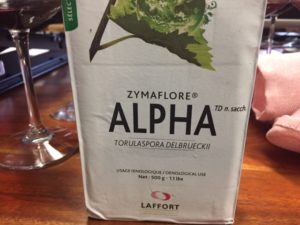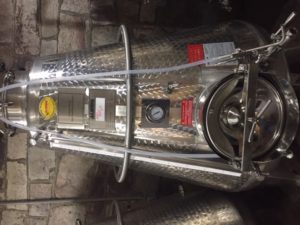Rock Roadhouse Winery, a k a Ch. Donze Vineyards, is Bath County’s first licensed winery, and produces only natural wine. They will hold their Grand Opening next weekend, September 3-7th, and are located at 125 Chateau Donze Ln., Hot Springs, VA 24445. The name “Rock Roadhouse” comes from a CCC building constructed in the 1930s which the Donzes turned into the winery/tasting room. Reservations for the event are required, and can be made via the website at www.rockroadhousewinery.com.
Starting Over
Proprietors Robert and Rhonda Donze are retired military who were looking for a peaceful, relaxing life in Bath County after years of active duty. Bob already owned land in the county, but had been mulling over a goal that had been in a long, slow “ferment” since his ’20s, when he tasted wine in Italy that reminded him of wine his grandfather had made, that “didn’t taste of chemicals.” Learning from several winemakers, one Italian, and a few Australian, and informed by taking winemaking classes and his own engineering background, he became determined to make natural wine in Virginia from Virginia fruit.
He has two vineyards in Bath County, with 12 white and 12 red varieties, six of each are vinifera (European) and six are hybrids. He also buys in grapes from other Virginia growers like Michael Shaps.
A Quest to Make Natural Wine in Virginia
A winemaker from northern Italy had told him that the key to his wine styles was anaerobic (non-oxygenated) winemaking, use of an authchonous yeast called Alpha (allegedly used by the Greeks and Romans), a very long fermentation of up to six weeks, and avoiding the addition of sulfites. “When you add sulfites, you kill 90% of all the micro-changes that wine would naturally go through,” explains Donze.
Fortunately at his location in Bath County, which has the highest mean elevation of any Virginia county, the climate resembles conditions in northern Italy, and he is able to harvest in October, and let the early, cool fall temperatures help slow his fermentations by keeping the winery doors open.
He uses carefully selected equipment just for this process. Instead of a “crusher-stemmer”, he has an Italian “de-stemmer/crusher”, which separates whole berries from the stems without cutting or crushing either. He uses oval shaped plastic flex-tanks for fermentation, which have air locks on the top to release C02 as it builds, but keeps the head space from any contact with oxygen.
Donze avoids the addition of the preservative potassium metabisulfite (KMS) which will react with the wine to produce S02 gas, also called “sulfites.” This is standard practice in conventional winemaking, to prevent oxidation and loss of fresh fruit character in the wine. Donze acknowledges the risk, and explains this is why he goes to great lengths through long, cool fermentations, excluding oxygen and using specialized anaerobic equipment, to make natural wine without having it get oxidized and spoil.
Donze is selling his aerospace company, and explains that the winery “doesn’t have” to make money, the project is an experiment to see if he can make natural wine successfully in Virginia. Their location right on Sam Snead Highway in Hot Springs with a fine view of the mountains west and the support of the Homestead will help attract visitors, as will wine quality. Donze explains that the owner’s club at the nearby Omni Homestead resort encouraged him to start the winery to help give spouses of golfers who didn’t golf a local, alternative attraction. He has had sommeliers and other trade persons taste his wines and says they’ve all been impressed with his style and quality.
This triangular Italian fermentation tank is used for white wines, and its shape allows for a natural rotational flow during fermentation.
Since the Alpha yeast stops fermenting at six Brix, Donze then inoculates each fermentation with conventional wine yeast chosen for each varietal or blend, to get the wine to finish fermentation to dryness. How does Ch. Donze’s natural wines taste? Pretty good, I’m pleased to report. Here, the natural, long, anaerobic fermentation with no added sulfites produces a similar style in reds and whites that has an added layer of dimension, a bit more complexity and depth of flavor than with conventional wines. Even though all the wines I tasted were from 2019, they seemed a bit more evolved and mature without any loss of fruit from oxidation. Quality and style were consistent, and aside from a new Virginia winery with quality products, Rock Roadhouse is offering natural wine that gives a new taste experience along with quality.
Highlights:
* Cayuga White ’19: A clean nose with apple and pear notes, much like a Vidal, and more fruit than you usually see in Finger Lakes versions of this Cornell hybrid. Palate: interesting, chewy, multi-dimensional, firm acidity, dry, good integration, complex for such a young Cayuga.
*Chardonnay ’19: Nose: subtle, nice typicity of lemon/mineral/ green apple (no malolactic fermentation). Palate: chewy, nice bright acidity, dry but full-bodied, good integration and balance. The neutral oak balances the acidity well.
***Touriga Nacional ’19: Fruit from Horton’s vineyards near Orange. Nose: lovely, classic markers of red and black fruits, pepper and spice, fresh and clean. Palate: acid a bit low but BIG mid-palate volume, with a fun mix of ripe fruits, pepper and lots of spices. Very classic for the varietal, a fine Virginia example. Very fruit-forward and hedonistic!
**Caberent Sauvignon ’19: Nose, closed at first with spice and hints of red fruits. Palate: clean, fresh, bright red cassis. A Cabernet where the fruit is the main feature. Round, smooth texture, dry but with great integration, supple and smooth.
***Petit Verdot: Nose: lovely hints of black fruits and spice! Palate: Wow! Loads of black fruits and spice, BIG volume, rich BUT velvety texture, fine integration. Fantastic for such a young PV!
***→*Tannat ’19: Style is very much like the fine PV only with the flavors and tannins of Tannat. Nose: complex blackberry and spice. Palate: vibrant wild berry fruit, very good integration with tannins and acidity; white pepper hints on the finish. Outstanding now, but will be amazing in a few years…if you can wait until then!


